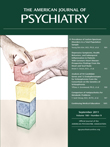Common Abnormalities and Disorder-Specific Compensation During Implicit Regulation of Emotional Processing in Generalized Anxiety and Major Depressive Disorders
Abstract
Objective:
Anxiety and depressive disorders are both associated with abnormalities in the processing and regulation of emotion. However, little is known about the similarities and differences between anxiety and depression at the neural level. The authors examined emotional conflict processing using a salient stimulus associated with observable and interpretable behavioral outcomes and with activation in limbic and prefrontal regions implicated in anxiety and depression.
Method:
Thirty-two healthy comparison subjects, 18 patients with generalized anxiety disorder only, 14 patients with major depression only, and 25 patients with comorbid generalized anxiety disorder and major depression were studied using functional MRI while they performed an emotional conflict task that involved categorizing facial affect while ignoring overlaid affect label words. The authors used behavioral and neural measures to compare trial-by-trial changes in conflict regulation, a test of implicit regulation of emotional processing.
Results:
Behavioral data indicated that only patients with generalized anxiety (i.e., the anxiety-only and comorbid groups) failed to implicitly regulate emotional conflict. By contrast, deficits in activation and connectivity of the ventral anterior cingulate and amygdala, areas previously implicated in regulating emotional conflict, were found in all patient groups. Depression-only patients, however, compensated for this deficit by also activating the left and right anterior lateral prefrontal cortices, in which activity was correlated with behavioral evidence of successful implicit regulation, thus mediating the disorder-specificity of the behavioral phenotype.
Conclusions:
These data support the existence of a common abnormality in anxiety and depression in the ventral cingulate and the amygdala, which may be related to a shared genetic etiology. Compensatory engagement of cognitive control circuitry in depression illustrates how the complex nature of psychopathology arises from the interaction of deficits and compensation, all of which can occur at an implicit level.



